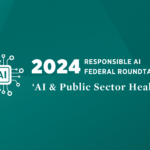Lessons on Equitable and Effective AI for Public Health
The Partnership for Public Service, in collaboration with the Boston Consulting Group, convened senior federal health leaders for a panel and roundtable conversation on the responsible use of generative artificial intelligence, or GenAI, to improve agency operations and public health service delivery.
Leaders of public sector health organizations valued privacy, equity and accuracy well before the advent of AI. Nevertheless, these leaders stressed the need to translate existing best practices into robust AI governance frameworks that improve health equity and outcomes as agencies integrate this emerging technology into their work.
Below are the main takeaways from the convening.
Talent underpins everything
Having the right team, with the proper blend of skills and experiences is the principal driver for equitably, responsibly and effectively implementing AI.
- Hiring and training managers should focus on workforce flexibility and skill fluidity
- Skill adjacencies and collaboration are critical to spreading best practices throughout organizations
- Technologists need training in health equity, medical bias and related subjects in the health services domain
- Domain experts, program managers and leaders need training on AI equity and implementation
You can’t learn if you don’t try
Overcoming risk aversion while prioritizing safety is a narrow path; pilot programs can help agencies walk it with care.
The best of these pilots will achieve intermediary outcomes using modest agency resources. At this scope, these pilots present an opportunity to advance scalable, innovative improvements. Employing user-centered design will reveal talent needs and workflow issues that must be addressed to scale and sustain the programs.
Garbage in, garbage out
Technical leaders identified the U.S. public health sector’s IT infrastructure and data standards as critical areas for improvement.
For over a decade, other countries have held data interoperability and usability standards that make data sharing easier, more accurate, and more beneficial for patients and providers. These efforts position those nations to train AI models on high-quality data that will vastly improve efficacy.
Preparing America’s health data for serious AI training requires significant effort. Outdated IT infrastructure adds additional requirements for the usability of health data, increasing the complexity of the task ahead. Investing in standardization and modernization across the health data and infrastructure enterprise is critical to developing AI.
Governance is essential to build trust
- Use cases and certification: AI systems are tools on the belt, and government must use the right one for the right situation. AI is excellent with mature, stable data, like cancer image screening. Government should focus on these use cases to harness the efficiency of AI and mitigate drift vulnerabilities. As government tunes AI models for proven use cases, leaders hope to see certification systems that will ease model adoption and sharing.
- Collaborative governance: Government AI governance is in an organic stage. Leadership can support its development and impact by lowering collaboration barriers across government. Working together, these teams can translate existing guidelines and staff training into AI governance frameworks and testing measures that drive trustworthy AI.
- Sociotechnical validation: Addressing social metrics, like fairness, alongside methodological metrics, like causal connections to poor outcomes, will fuel the tight testing and rigorous validation necessary to manage AI’s outputs.
The trustworthy implementation of AI for public health requires careful adoption that focuses on skills, pilots and foundational infrastructure. Federal health agencies using these methods to collaboratively build governance structures can extend the maxim of “no harm” across their service and benefits delivery operations.
The 2024 Responsible AI Federal Roundtable Series is being offered as an opportunity for federal leaders to convene on timely topics in AI. The series is currently supported by and delivered in collaboration with IBM Center for The Business of Government, Boston Consulting Group and Deloitte. See other blogs in the series: Perspectives on the ethical use of artificial intelligence in government.
